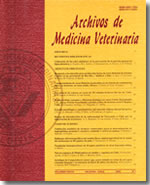Immune-serological identification of infectious agents with influence on bovine embryo transfer in the north of Brazil
Main Article Content
Abstract
ABSTRACT. The aim of this study was to investigate antibodies against brucellosis, leptospirosis, bovine rhinotracheitis (IBR/ BoHV-1), bovine viral diarrhea (BVD) and neosporosis through immunodiagnostic. These agents may directly or indirectly compromise the female bovine reproductive tract as well as embryonic and fetal development, therefore we also tried to establish a probable relation between those antibody with the utilization rates of fixed-time embryo transfer (FTET) protocols, with pregnancy rate per embryo transfer (ET) and the occurrence of miscarriages. Embryos were obtained by in vitro fertilization of the ovum and sperm from the Gyr dairy breed, which were transferred to 235 zebu-crossbred cows under FTET protocols. The blood samples to obtain serum were collected by venous puncture from coccygeal vein, only a few days of the completion of ET. For the immunodiagnostic research of brucellosis, leptospirosis, IBR/BoHV-1, BVD and neosporosis, the complement fixation assay, the microscopic agglutination test, virus neutralization, and linked immunosorbent assay to enzymes in conjunction with the indirect immunofluorescence were used. The utilization rates of the FTET protocols related to pregnancy and abortion in D16, D35, and D75 were 67.23%, 34,18% and 20,37% respectively. The immunodiagnostic results related to seropositive animals were obtained for brucellosis (7/235 = 2.89%), leptospirosis (128/235 = 54.47%), IBR (103/235 = 43.83%), BVD (174/235 = 74.04%), and neosporosis (150/235 = 63.82%). In seropositive recipients, there was an observed influence (P < 0.05) of leptospirosis and neosporosis on the rate of protocol utilization of brucellosis on both the pregnancy and abortion rate, and of BVD and IBR on abortion rate.

